#like i love keir i do... but also i find some of the dialogue in his route annoying on a personal level
Explore tagged Tumblr posts
Text
I'll be honest I really hate height differences in vns... like I'm short so technically that writing should be geared towards me, but personally it just feels very infantilizing and it's so annoying. I know a lot of people are into it but it to me it's just kind of upsetting
#i really hate feeling weak#idc if it's a fantasy world where somebody else will protect me i really hate being forced into this position of helplessness#and extensive descriptions of height difference just contributes to this#like i love keir i do... but also i find some of the dialogue in his route annoying on a personal level#(hence why kari is a fucking titan lmao)#and let's not even mention touchstarved!#ik the full game is going to be painful for me bc these descriptions are most used with ais of all people so uh. yeah. not looking hot#(also why kaiho is big jaded and has some fighting prowess. the mc in the game is always so clueless and weak even with the hound bg)
41 notes
·
View notes
Note
I hear you, dreanty. I have had my hyperfixation on obscura for a while now, and Keir specifically has me in a chokehold (tho my favorite will forever and always be Oleander). The way Keir is so connected to his role as mouseholes leader and wants to protect everyone is so urgh <3, and the bickering between him and vesper is so good!
anyway, feel free to yap about it!! Obscura is so great
~🌿
Okay thank you for holding my hand and letting me yap. Spoiler for keir’s chapter 2
Please don’t mind how badly it’s written I’m literally writting how i feel about keir x vesper with no filter straight out my mind.
I really like Keir and Vesper relationship as a whole ans the fact they banter yet accommodate to each other in a way that isn’t romantic per se but very close. They are close, they live together they share a house and they have this casualty that makes their banter more banal. Vesper is expected home, someone expect them home and care enough to wait for them when they aren’t there. Vesper wants to decorate the house, to put a part of themselves in the space they share, the only place under the mountain that is their home cause it is ! It went from Keir’s home to their home !
They both talk to the bones of the house, they have habits and familiarity and it’s a sene of love that isn’t automatically romantic but it’s love ! ( that why I’m devastated about the ending of chapter 2 btw- )
They are close to each other but thinking the other don’t share the feelings they keep their guard up. That why Keir asking about vesper eyes is so intimate. Like it’s so much more intimate than him asking if vesper has a deadly ilness ! This is a question you ask because you care about the other one, there is yearning in knowing more about them because you want to know more about them, they aren´t just someone random it´s the person who's being haunt you, you need to get a grap of the slighlest detail about them to hold it dear to your heart. Keir gets upset if you say you lied about your eyes beause he trusted you first hand, it´s the first time he blindly trust you.
Also Keir keeps saying about « when i’ll see your face » in his mind it’s a fact that at some point he will see their face it’s no an « if » it’s a « when » He fully assume or wants to believe that it will happen. He dosen’t want to idealize vesper but he think about it, he think about them and what they might look like. Keir desperately wants to know about the most private knowelge about vesper, what do you look like, you are special you are Vesper and i need to see you humanly i want to see you humanly.
Also the fact that he laters calls the market event a date ? In his mind he was being very obvious about his feelings but going out to buy furniture for your shared house being taken as a date ??? That casual married couple activity I’m sorry-
Now about the tooth gap if you choose to say you have one not only it’s a revelant information about yourself ( and when listing your face attribut he says nice smile instead of simply tooth gap + vesper later on has a dialogue when they say they would be happy with the thought that he might find his smile cute ) BUT ALSO- this information comes back later after he kissed vesper. His mention of feeling the tooth gap has me on the ground because he can’t see vesper, he still can’t answer the question that has been haunting him but feeling the tooth gap makes it more real, it’s there and it’s Vesper’s face. It’s not just a word that could be a lie, it’s a real fact that he gets to feel.
I am now out of battery so i’ll stop here to go find a charger but my fucking god- i am unwell.
51 notes
·
View notes
Note
im rly enjoying hearing about bea, it’s always so impressive to me how you can make so many very different characters and yet they all feel complex and very grounded in the setting! do you have a process for coming up with them or do they just sort of fall into place?
ahh thank you!!!
i don’t know that i have a specific process exactly... i love making characters who are very grounded in their setting & origin so i kind of work up from that. for me everything is about backstory and how that feeds into motivation and big decisions
that can go in either order, so like: minerva’s basic character concept starts with me seeing the circle and saying ‘what if i make a character who really tried to fit in here and be everything this place wanted?’, in combination with the later-introduced addition once i knew more about the setting, ‘what would it be like to have tevinter elven heritage but end up in a southern circle?’ i only go from there—the backstory—to figuring out what this person’s goals might be as the grey warden, so minerva’s ambition and obsession with optics stem from that, and her decision to spare loghain, her choice of romance, etc. all from what i think someone with that background might do
keir’s basic character concept starts with my interest in some red hawke/anders dialogue i’d heard and the concept, ‘it’d be fun to play a hawke whose love is so clear and ruthless that the question of whether or not what anders finally does is morally acceptable is almost irrelevant because he’d stand by him even if it wasn’t. what kind of person would do that?’ so with him i’m doing it in the reverse order, i’m starting with the motivation and the big later decision and then “reverse engineering” the backstory, what his relationship with his family must be like, how the hawkes’ childhood affected him. and in funny ways that changed what i started with; technically the original concept is still true, but when i made keir so protective and dedicated and fierce to justify those depths of devotion, suddenly he was really angry and heartbroken after the chantry explosion regardless, because anders was willing to throw away the life that mattered so much to him, and because anders expected him to kill him, which is the antithesis of his entire character and suggests anders might not know him very well at all. that’s the best thing, when they start coming to life in ways i didn’t expect
coming up with inquisitors i can stick to is harder for me because they don’t have what the warden and hawke have, which is a clear backstory environment and cast of characters i get to work with for those building blocks. so the reason i find trevelyans so much easier than other inquisitors to make is that i know a little about medieval history and how christian(-coded) nobility works, so it’s very very easy for me to like... figure out the “cast” i might be working with and play barbies with the setting and decide how some people might turn out. i think the eagle-eyed can notice that when i come up with a new inquisitor, it’s usually an idea for backstory and how that makes a character, even if a simple one, like: “what if i play a very privileged member of the carta who’s never fought like this before in her life?” “what if i play an older dalish character who has leadership experience?” “what if i play a pious young noblewoman who’s not yet had any experiences that break that mold?”
for me i very much believe setting is closely closely intertwined with character. it’s why i find it really difficult to make one in a setting with less hard rules, like bg3. i believe that people, based on whatever circumstances they grew up in, learn a set of logic and behaviours and frames of reference for how they think they can best deal with situations. that’s defined by your “personal” backstory, your family and your life and so on, but also by your place in the world. what were you taught about who you are and who other, different types of people are in comparison? where do you come from? what’s your religion? how much money are you accustomed to having? who in this world do you look up to? i don’t believe in making characters in isolation from all that, i’m not sure how it can be possible. it’s why i’m so passionate about dragon age, because it gives me a world that is so full and varied with options of where to come from, but also has so much room with blank spaces for you to write into and characters who can have very nuanced individual experiences that still belong in thedas. i really love it jgshsksk
i hope any of that made sense 😭
#very flattered btw i love YOUR characters and art sm#ive been meaning to ask more abt your mahariel but ive been too shy rip
42 notes
·
View notes
Text
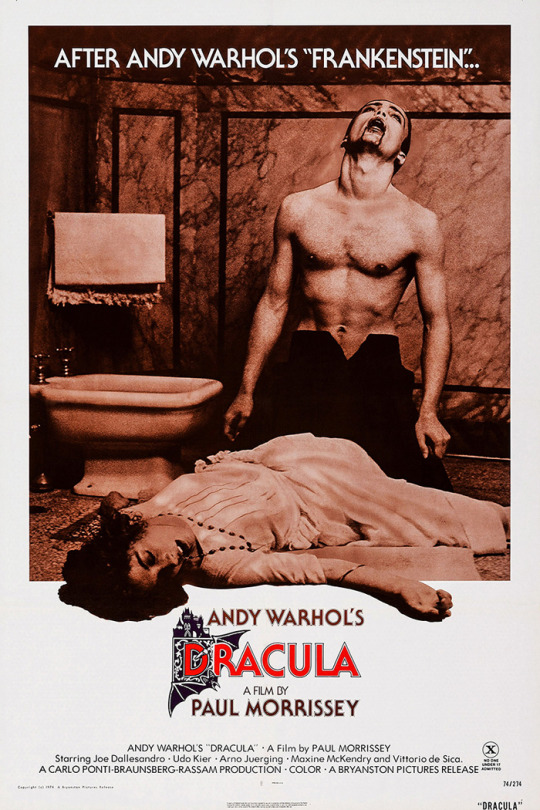
#HARPERSMOVIECOLLECTION
2023
I watched Blood For Dracula (1974)
I have somewhat seen this before on late night tv, along with it's counterpart Flesh For Frankenstein.
A sickly Dracula travels to Italy to find a virgin to cure him.
If I was to ask, "Hey, do you wanna see a very bloody, soft-core-esque Dracula movie starring Udo Keir and presented by Andy Warhol?" You'd either say, "What? No." Or "Absolutely, give me that now, push it into my face if you have to." There would be no in-between.
Well, before you answered you might ask, "What does PRESENTED BY Andy Warhol mean?" And I would tell you that he had nothing to do with this movie, other than knowing the guy who made it.
Director Paul Morrissey, has made some other movies, which I have not seen. They all seem like slightly queer trash art. A genre I'm absolutely here for in theory.
I'll start with some of the technical stuff, then move on to the movie as a whole.
Morrissey is very competent behind the camera. He understands shot construction and I rather like his visual choices.
The dialogue is often clunky and I'd argue that the script isn't well written or very engaging. And, the fact that a lot of the actors clearly speak English as a second language isn't helping that clunky dialogue.
I should also mention that this is supposedly a horror/comedy, but its less funny and more "funny" in the way which artists think they're being "funny".
Udo Keir is very good here as a rather vain Dracula. He's stage acting and it fits his character. The other acting and actors throughout are hit or miss, but some people definitely shine and would shine more if they had interesting things to say. Arno Jeurging is definitely having fun in his role. Joe Dallesandro's New York accent is almost shocking amongst the Italian, German and British accents that surround it. His acting isn't good, but he's good for a few chuckles.
Overall this film, technically speaking, is ok for shitty gothic horror of the era and a film that has a look that I adore. Dreamy, with a hint of British soap opera and a handful of italian horror. The locations are gorgeous , as are the people and the costumes.
So, how's the movie as a whole.
Well, it's not a high art piece by any means. Outside of attempting to have more tits and ass and excessive blood, nothing really separates this from other horror of the era, and a lot of directors were doing this much better back then. It's stilted and none of the story or action has any weight to it. There's no real scares or laughs either. A few moments of being able to laugh at it, but not with it. Also, the hero assaults a couple women, rapes a 14 year old, and is just kind of a dick. Not really a guy you want to root for.
But, despite the movie not being all that great, there are some moments I enjoyed. I laughed through most of Dracula's Seizures and a few strangely delivered lines. (Not sure if I was supposed to, but I did.) I loved looking at the pretty people being pretty and wearing pretty things, or being pretty and naked. I loved the look of it all, honestly. I loved the end where Dracula is being hacked up. I loved how self indulgent it felt and how absolutely trashy it really is. I loved that it tries to toss in some form of a classism discussion and doesn't really follow through on. Is Count Dracula's illness supposed to be a metaphor for the dying upper class? If so, it's a pretty weak one, and just an attempt at trying to make this seem more high minded than it is.
Basically, I admired the terribleness surrounded by pretty things.
This movie is trash with a little bit of fun to it. There's enough here to it to watch it once, just to see it.
5 notes
·
View notes
Text
Everything wrong with ACOFAS: A Rant Part Three
Disclaimer: This is part three and will continue from pages 97 to 150. Part one can be found here. Part Two can be found here. Part four can be found here. These page numbers come from the UK paperback edition of A Court of Frost and Starlight. This is my own opinion of the book - the writing, the grammar, the characters, etc. I won’t be commenting on anything that may have been plagiarized or that has been ripped off from the history of other cultures as SJM has a tendency to do. If you disagree with my opinions, I’m sorry and hope you see the error in your ways.
Page 99: Saying ‘wine will make you feel better’ really gives off the wrong impression when this is a book targeted at young kids. I mean, it’s written for the YA genre which is typically categorized for ages 12 and up.
Page 101: I’m so fed up of people talking badly about Nesta. Having Amren say ‘That’s if she shows up sober’ when she has walked in to see Feyre, Cassian and Azriel all drinking wine? Feyre and Cassian being ‘drunk’? Double standard! Unfair!
Page 102: So Elain managed to become a seer with the cauldron, right? So… Are there other people - sorry, Fae - who are seers? Why does the cauldron affect people in different ways?
Page 107: Amren was turned into a High Fae in the last book, which means that she no longer has to drink blood as food. But why did she ever have to drink blood? I don’t think it was ever explained. Why?
Page 108: Elain asks Amren if she could have taken on a male form and Amren replies with ‘Before, in my other form, I was neither. I simply was.’ Was that supposed to be SJM’s cheap shot at adding some gender diversity? Because I would have loved to see Amren be this non-binary power house asexual dragon but who has time for that but she uses she/her pronouns throughout the entire series and this is the only mention of her being able to switch between genders.
Page 112: ‘…A few drunk revelers spotted us and fell silent. Felt Rhys’s power, perhaps my own as well, and found somewhere else to be for a while.’ Why would they want to find somewhere else to be as soon as their High Lord and High Lady show up? Why are they showing fear at the feeling of their power? Aren’t Feyre and Rhys supposed to be the good guys? This reads a lot like the people of Velaris are scared of them…
Page 115: ‘Gentlemales’ GENTLEMALES. GENTLEMALES. GENTLE FUCKING MALES?!?!?!?!
Page 116: ‘Indeed, some people were turning our way.’ This is just… This word is useless in general but in this book? I don’t think it was edited properly.
Page 118: ‘A scene. This was about to become a scene in the worst way.’ SJM does this quite a lot in this book. These little two sentences where she says something and then expands on that something. It was used twice before already and I didn’t write it down because I thought it was just a writing choice but… it’s a poor one. It feels like a way to get the word count up somehow and, quite frankly, it’s bad writing.
Page 118: Feyre is annoyed that Nesta is asking for her to pay her rent? How else does she suppose that Nesta should pay for her rent? She had a home that was taken from her back in the human world (that was taken from her because of Feyre, mind you) and all she asks is that Feyre pay her rent because she doesn’t have a job in fairy land? That seems pretty reasonable. Feyre shouldn’t be mad.
Page 121: ‘But those were her deaths to claim.’ Why does everything have to be paid with death? I think it would be a lot more empowering if Mor would meet with those who wronged her, say something about them and her and just walk out of their lives entirely? SJM should start preaching forgiveness a little bit more but, hey, that’s just my opinion. Plus, this is really making Rhys seem like a bad ruler. Wanting to kill his enemies? No.
Page 122: ‘Keir is coming soon, isn’t he.’ Yeah, no, this wasn’t edited.
Page 122: ‘When.’
Page 125: ‘Az has a list of kingdoms most likely to cross the line.’ I’m wondering why the Night Court is in charge? Why does Rhysand get to decide which kingdoms and courts cross the line? Why does he get to decide where the line is?
Page 126: As I said for Page 118, Rhysand says: ‘Tempting. So damn tempting to tell…’ See what I mean?
Page 126: If Rhysand deals with conflict by fighting fire with fire, then his court is going to fall apart. Why is he allowed to get away with attacking Tamlin the way he did? What are the basic rules of the court - any of the courts? Surely the people wouldn’t want an insufficient ruler so do they get a say in it? WHY ARE THE HIGH LORDS ALLOWED TO ACT LIKE BLOODTHIRSTY BEASTS?!
Page 126: ‘Too long. She’d been cooped up within the borders of this court for too long.’ Wow, once you tune into it…
Page 127: I really want to make one thing clear. Not every piece of dialogue has to have a tag attached to it. Sometimes things work much better if you just use ‘I said’ or ‘he/she/they said.’ At least then it would mean less lines such as this ‘I laughed again. ‘Certainly not Amren. Not if we want peace,’ I added.’
Page 127: Also, Rhysand ‘want(s) peace’? Bullshit. Not seven paragraphs ago did he laugh about Mor wanting Tamlin dead and a page ago he was tempted to tell ‘the High Lord of Autumn that his eldest son coveted his throne.’ Do not think for one second that Rhys is a level headed ruler. SJM has a tendency to tell us that he is rather than show it.
Page 128: ‘…Even the wine I’d returned home to drink couldn’t dull.’ Teaching young, impressionable people that alcohol might solve some of your problems. Great. And what - Feyre can say this but Nesta can’t drink?
Page 129: ‘Decadent - it felt decadent…’ I really wished I had never picked up on this.
Page 129: Feyre keeps complaining about the amount of work she has to do but here she is shopping with Elain? When her people are scared, heartbroken, without a home and in mourning after the war?
Page 129: ‘So different. This place was so different…’ ON THE SAME FUCKING PAGE?!??!
Page 131: So I guess that nobody ever told SJM that a character description goes beyond eye colour, hair colour and clothes?
Page 133: ‘I might ease that grief, make the pain less.’ Feyre’s powers allow her to do that? When, why, how and fucking what?
Page 134: ‘I was lucky - so tremendously lucky.’
Page 134: Rhys was dead and he was brought back to life, right? It wasn’t like with Feyre’s death where she was still slightly conscious because she could hear what was going on, no. No, with Rhysand’s death, he really was dead. But he was brought back to life and somehow… feels nothing from this? I would love to see if there are times where his body becomes slightly misty and ghostlike, if his veins turn black under his skin because they had stopped working during that brief moment of death. I would have loved to see something other than just him feeling a little bit tired!
Page 134: ‘How.’
Page 135: I’s very clear to me that, for whatever reason, SJM wanted Feyre to be able to paint but she has no idea how to write about it. Whilst Feyre is painting, we only read about her need to create and what the end result looks like. Even during her process we hear nothing about light and perspective and I’m not a painter but there’s a true science behind it. And where is she getting the paints from? Rhys was able to give her some with his magic but from where?
Page 138: It disgusts me that Feyre thinks that she can solve the people of the Night Court’s problems by teaching them how to paint. These people went through a war! And before that it was Under the Mountain! Painting and creating art in general can help with recovery from mental illness and trauma and PTSD and depression and everything else, but there comes a point where therapy is needed. Memorials are needed, ceremonies are needed. How are people supposed to paint what they feel when they can’t understand what they feel? It’s bullshit and, really, quite a childish thing to even suggest. How is this a ruler?
Page 139: Why do jigsaw puzzles exist. Why are they called jigsaw puzzles. SJM is not a high fantasy writer.
Page 140: ‘Good thing indeed.’ You guys know how I feel about this word by now, right?
Page 140: ‘Indeed, each seemed like a different decade.’ So the fashion changes with time, does it? Great! Tell me more. Tell me why and how and when. Also, indeed.
Page 143: ‘The females bring their jewellery. I bring my weapons.’ But Cassian is a feminist, right? Yeah, no, guys, it’s alright. He’s a feminist, it’s all fine.
Page 146: ‘You being too drunk to climb the stairs last night.’ I’m really not okay with the amount of casual drinking in this book - and not only that but the way it’s treated. Nesta is shamed for it, Feyre mentions that even wine can’t help her, Rhys makes jokes about his friends being drunk. It sends a really bad message.
Page 147: ‘Illyrian baby indeed.’
Page 147: I’ve said this before but someone should really tell SJM that every scene in a book should further the plot. This has been three pages of bickering, useless drivel about a bed being too small for Cassian and cheap jokes about alcohol. The entire thing could be cut and the story wouldn’t change.
Page 148: ‘Indeed, as Feyre emerged from the kitchen hallway…’
Page 148: ‘Strange - so strange to see…’
Page 149: ‘Indeed.’
Page 150: ‘Mor was instantly on her feet, offering - insisting on wine.’ This is just teaching kids that you need alcohol to be able to have a good time! Which isn’t true in the slightest! And it’s wrong on so many levels - especially insisting that everyone has wine! Peer pressure?? SJM deals with sensitive issues so badly (see what I said in another post about Rhysand and sexual assault) that it’s… It’s hard. Yikes.
#anti sjm#anti sarah j maas#anti feysand#anti acofas#anti acowar#anti acomaf#anti acotar#anti feyre#anti rowan#anti rhysand#anti rowaelin#anti cc city#anti crescent city#anti tog#anti aelin#my post
49 notes
·
View notes
Text
2001: A Space Odyssey (1968) Review
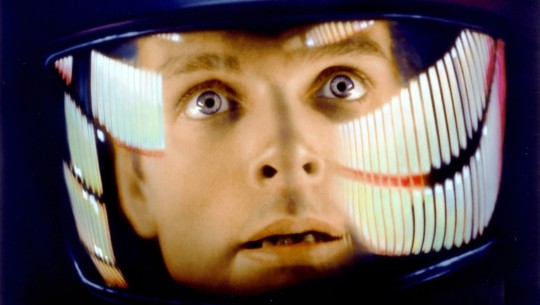
(This movie review includes big spoilers.)
2001: A Space Odyssey is a difficult masterpiece. There are so many books, documentaries, articles and interviews about it. I'm not sure what a review by little old me will contribute to the zeitgeist, but here we go.
I'm going to date myself, big time. I was an adolescent when I saw this movie in the theater. And it wasn't a tiny cineplex, because we didn't have those back then; it was one of those huge old theaters with an immense screen. 2001: A Space Odyssey blew my mind. My mother, who liked science fiction even though she was never into it as much I was, was blown away, too. As we were leaving, she said something like, "I have no idea what that movie was about, but I loved it." I said, "Me, too." And then we spent a couple of hours talking about how it looked, how it sounded, what might have happened and what it could possibly mean. This movie made us think, and talk. It was one of my most memorable childhood movie experiences, possibly the best I ever had with my mother.
And yet, while 2001 consistently makes top-ten-of-all-time movie lists, some people think it is monumentally dull. I will readily admit that it is 180 degrees away from films like Star Wars. When 2001 was released, the critics fell into separate camps on complete opposite ends of the spectrum, as in either "It's absolutely brilliant," or "It might be the worst movie ever made." I find it fascinating that, even after all these years, people come away from this movie with such vastly different impressions.
2001: A Space Odyssey was produced and directed by the brilliant and controversial Stanley Kubrick, and it was written by Kubrick in collaboration with one of the great science fiction novelists, Arthur C. Clarke. It took a long time to make this movie, and Kubrick was obsessed with getting every detail absolutely perfect, a monumental feat when you consider that it was pre-CGI and every single object and scene in every frame had to be imagined, considered, designed and created before it was filmed.
I feel like my vocabulary is inadequate when it comes to describing how this movie looks. Every shot is so perfectly framed, the photography so stark and imaginative. The space stations and ships, especially Discovery One, look real, functional, and exquisitely beautiful. I've always wondered if Kubrick deliberately created ships that looked like they had faces and space helmets that resembled animal heads, or if it was a happy accident.
Much of the movie has no dialogue and when it isn't silent, it is accompanied by disturbing choral vocalizations, the stunning and majestic "Also Sprach Zarathustra," or exuberant classical music. I'm pretty sure no one had ever paired classical music with science fiction before 2001. There are other memorable sounds, too: alarms, electronic shrieking, the grunting of the apes, the breathing that is all we hear from Dave while he is trying to shut down Hal.
2001 has three distinct sections, with the third being the longest and most memorable.

I don't have a lot to say about the first section, in which a mysterious black monolith somehow changes our starving ape-like ancestors into tool users. Except that the ape man (he has a character name: Moonwatcher) tossing the bone into the air that turns into a spaceship might be the most brilliant segue in the history of the movies.
Four million years later, humans uncover a black monolith buried on the moon that sends a radio transmission to the orbit of Jupiter. The shuttle slowly docking with the partially constructed space station to the accompaniment of a Strauss waltz is spectacular. So is the look of the interior of the space station which is peppered with familiar corporate names, most of which have survived the sixties. I've always loved how the beauty of technology created by human beings is given as much weight and attention in this movie as the beauty of nature, space, the stars and the planets. I particularly liked the symbolism of a pen, another extremely important human tool, floating in the air like the ship floating in space.
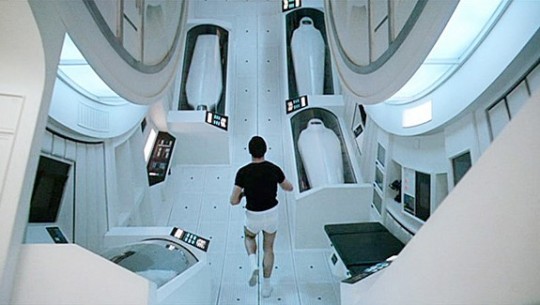
Eighteen months later, the space ship Discovery One with five astronauts on board is nearing Jupiter. Three of the astronauts are in suspended animation, so the action centers on the other two: Dr. David Bowman (Keir Dullea) and Dr. Frank Poole (Gary Lockwood), plus the HAL9000 computer, the artificial intelligence that runs the ship. Dave and Frank both come across as real astronauts, highly trained and even-tempered professionals who stay calm even in life and death situations. Which is what they soon find themselves in as Hal's conflicting instructions cause him to go mad.
Hal is so pleasant and amusing at first with the banter and the chess, although what he is about to do is foreshadowed since Hal's point of view always shows Dave and Frank as distorted. (There is also foreshadowing when Dave and Frank are shown sleeping in their coffin-like beds.) Their extreme isolation is highlighted during the taped interview with the BBC when we learn that Discovery is so far away that it takes seven minutes for a transmission to reach Earth.
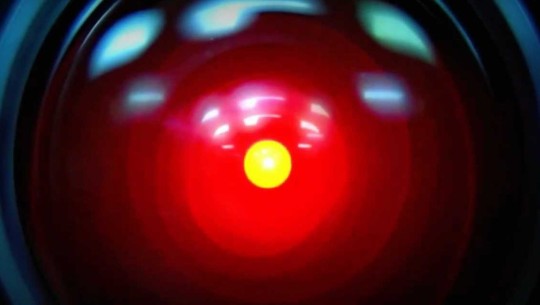
The Hal sequence is undeniably the edge-of-your-seat part of the movie, as Dave and Frank slowly realize that their soft spoken, efficient, all-powerful computer is lying to them. Although the constant close-ups of Hal's "eye" are undoubtedly creepy, Hal's voice is so melodious and calm -- an excellent vocal performance by actor Douglas Rain. I remember how shocked I was the first time I saw this movie when Hal eavesdropped on Frank and Dave in the pod by reading their lips. Humans just don't expect the tools they create to turn on them. Does Hal have genuine emotions? Is he just simulating what he was taught? What would be the difference?
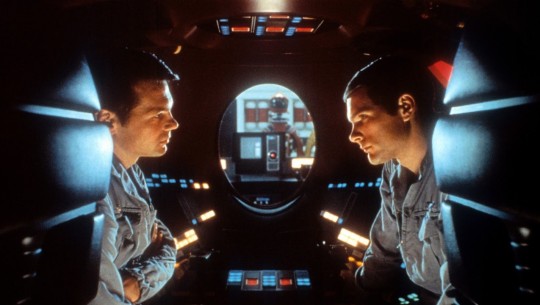
After Hal kills Frank, we can see the patterns of light and shadow playing over Dave's face as he nearly succumbs to panic, realizing that he must either expose his naked face to vacuum in order to get back into the ship, or die outside in the pod. I've always loved the disconnect scene where Dave, wearing a mismatched green helmet on top of his red space suit, won't respond to Hal's apologies, questions and suggestions while he carries out the complex actions that will kill Hal. All you can hear of Dave is his breath as Hal degenerates into a baby computer and sings a song ("Daisy") that was taught to him by his creator. Interesting parallel, when you consider what ultimately happens to Dave.
Dave completes the journey alone, and appears to take a pod into the monolith that is orbiting Jupiter. What is Dave seeing during this "trip" in the most bizarre of sixties psychedelic colors? Is he seeing the home world of the beings that created the monolith?
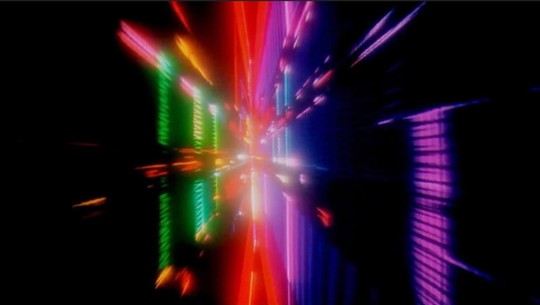
Since the monoliths were deposited in our solar system four million years ago, it seems unlikely that the aliens were still hanging around. I've always assumed that they left their automated monolith "seeds" and moved on. I've also always wondered -- what did the powers that be on Earth think that the astronauts were going to do with that monolith? Go up and knock?
It's also fascinating to conjecture what is happening during the surreal, strangely lit bedroom scene at the end. Dave appears to see older versions of himself, and then he becomes each older version of himself: quite elderly and in a robe eating dinner, visiting what looked like a fully appointed bathroom, in the bed as he breathes his last before turning into a strange space infant floating above the Earth. Did Dave spend the rest of his life in a real place (unlikely) or was it simply a mechanism that took his mind to the end of his life so that he could be reborn?
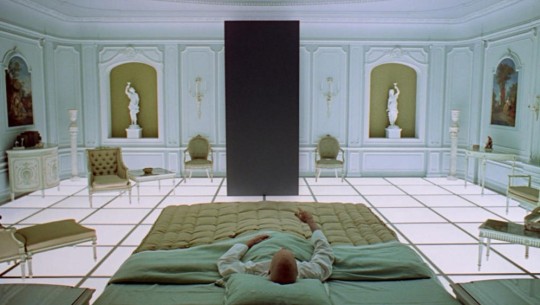
What does Dave become? Is it the fate of the entire human race, or is it just him?
There is a 1984 sequel to this movie entitled 2010 that doesn't really answer this question. At least it's based on a book also written by Arthur C. Clarke, so there's that.
Bits:
— Even though the five astronauts on the Jupiter mission are all white males, Heywood Floyd runs into several colleagues on the space station, three of whom are women, and obviously some of whom are Russian.
— BBC 12. Loved that.
— I also loved the zero gravity toilet with the very, very long list of instructions on how to use it. Unspoken was how uncomfortable and difficult it would be for the user to absorb and follow all of those instructions when they really had to go.
— Gary Lockwood, who played Frank Poole, was also featured in the second Star Trek pilot. I had a pleasant encounter with him at a Star Trek convention, which I related at the bottom of my review of "Where No Man Has Gone Before."
— Dave: "Open the pod bay doors, Hal." Hal: "I'm sorry, Dave. I'm afraid I can't do that." I use "I'm sorry, Dave" a lot in my real life.
— Hal: (trying to talk Dave out of turning him off) "I feel much better now. I really do. Look, Dave, I can see you're really upset about this. I honestly think you ought to sit down calmly, take a stress pill and think things over." Laugh out loud.
Every few years, I watch this movie again. It's such a rich and complex motion picture that I inevitably see something I never noticed before. Four out of four pod bay doors, of course.
Billie Doux loves good television and spends way too much time writing about it.
#2001: A Space Odyssey#2001#Stanley Kubrick#Arthur C. Clarke#Hal 9000#Dave Bowman#Frank Poole#Doux Reviews#Movie Reviews#something from the archive
4 notes
·
View notes
Text
Film and Fluff Blogging: A Review of Atypical Season 1

...
I have very few words to say about Atypical, except that it is one of the most emotionally raw, powerful, touching, heartwarming TV series I have ever seen. After finishing the first season of this masterpiece, I was blown away to the point of speechlessness, and that is no small feat. I am known by many to be a brutally honest and harsh critic, and it takes a great individual to be able to impress me. Not only has the creator of Atypical, Robia Rashid, impressed me, but I believe that her magnum opus will leave audiences everywhere--especially those who have Autism/Asperger’s Syndrome--feeling as if they have a voice in the world. In fact, I feel so strongly about the quality of this piece, that I am genuinely overjoyed that such an amazing piece of work will be able to reach an otherwise silent community.
This analysis will feature my first-ever review of a TV show, as well as a Netflix Original. Interestingly enough, I have always been indifferent about Netflix titles. I have found entertaining films and television shows through Netflix, but until recently, I never bothered to view any of the content that they produced. If the the quality of Atypical is indicative of what I am to see from Netflix Originals, however, you can be certain that I will eagerly be awaiting more of what they release.
Sam Gardner, a boy with Asperger’s Syndrome (it is mostly referred to as Autism in the show), is largely considered a social outcast. Although many of the girls around him seem to avoid or ignore him, he wants very much to find love. Sam, unfortunately, finds an incredible amount of difficulty in this want, as he feels many of his Asperger’s symptoms limit him from meeting the right person.
While the story of Atypical seems minimalistic, it’s in this simplicity that viewers can find an immediate appreciation for the show. Many people with Asperger’s Syndrome/Autism do in fact find socializing and navigating the world of romance challenging, and they can immediately identify with Sam’s plight. As a person with Asperger’s, I can confirm this, and have been considered awkward by the people in my life for the same reasons Sam is. Keir Gilchrist shines as our main character, and every gesture he makes onscreen perfectly encapsulates the mannerisms of others like his character. The monotone voice, his fidgeting habits, lack of eye-contact, literal interpretations--all of it and more gives a perfect illustration of typical Asperger’s interactions. But I’m slightly digressing from the topic. As I said before, everyone with ASD can understand Sam’s struggles in finding a partner. Despite his innocent and unknowing attempts to charm girls, they are all turned away by his efforts, and he is left to discover the right person once again. Each time Sam is rejected, it is easy for everyone who watches his to sympathize with him, as well as hope that he will soon find who he is meant to be with. This relatable conflict is where most of the show’s enjoyability, empathy, and even humor, are derived, and this story was a very clever and considerate angle to use when addressing the difficulties of Asperger’s Syndrome.
Another impressive element of Atypical is the fluidity of its storytelling. Rarely do screenwriters understand how to properly weave subplots into their narratives, but this show has a skilled crew working behind the scenes. Throughout the show, viewers are given the opportunity to know Sam’s family, and each of them have undergo relatable trials, as well. Casey, Sam’s violent, but loving younger sister, often feels neglected because of the amount of care her brother needs; Elsa, Sam’s mother, begins to feel threatened as she comes to believe that her role as a mother is diminishing; and Doug, Sam’s father, encourages his wife to no avail to discover a life for her own, without realizing that she is--in a scandalous way. Every person in Sam’s family is given an equal amount of screen time and focus, allowing for even more relatable conflicts to be drawn from them. It’s refreshing to see that a fair-sized cast of supporting characters actually add to a show, rather than detract from it.
Though I have already eluded to this, the characters of Atypical are complex, sympathetic, and very likable. Sam is innocent, unknowing, clever, intelligent, thoughtful, and determined; his best friend, Zahid, is a hysterical, ill-advised dimwit; Casey is fiercely loyal, ambitious, tomboyish, and boy-crazy; Doug is a bumbling, good-natured father who longs to connect with his son; and Elsa is a scatterbrained, neurotic, worrisome, and doting mother. Other characters in the show like Sam’s girlfriend, Paige, and therapist, are also sweetly, and it’s easy to see these people exist in reality. This is part of what makes fictional characters well-written, and the ones in Atypical are all memorable.
The performances give a genuine life to the characters being portrayed in this show. As I mentioned previously, Keir Gilchrist is undoubtedly the star of the show. Brigette Lundy-Paine, Michael Rappaport, and Jennifer Jason Leigh are also quite credible, clearly displaying the attributes of their characters perfectly. All of them have on-screen chemistry, and many of the exchanges between them are lively, heartfelt, and humorous. It’s easy to see how deeply the family dynamic in the show is felt, and even easier to see how each of the actors seem so connected to the conflicts of the characters.
Rarely do I ever acknowledge this about a show, but Atypical also provides standout humor. Many lines of dialogue are not only purposeful, but they allow characters to have oddly charming conversations. Even the in the face of conflict, there are subtle moments of levity that are shown, and these make for opportunities for tensions among the cast to be released. Some of the funniest moments come from Zahid’s tomfoolery and try-hard flirtation with girls. Whether he’s giving terrible advice to Sam about love, or making inappropriate gestures during his work shifts, he’s a lot of fun. However, much of the humor cleverly originates from Sam’s literal interpretations of his interactions with others, and these could be found all throughout the show. These interactions are great, and give a lighthearted tone to a show with a fairly serious subject matter.
Atypical is an absolute marvel, and a perfect show to watch with anyone with Asperger’s Syndrome. Anyone who knows a person with ASD will immediately sympathize with Sam’s external and internal conflicts, and the characters, their interactions, and the performances of the actors, can be enjoyed by people universally. I truly hope that more shows in the future will be as wonderful as Atypical, and that a rare few will allow for much-needed awareness, commentary, and heartfelt drama, to be brought to other communities who long to be understood.
#atypical#2017 shows#netflix original#netflix original series#emmy worthy#keir gilchrist#jenna boyd#amy okuda#brigette-lundy paine#jennifer jason leigh#nik dodani#atypical review#michael rapaport#for your emmy consideration
5 notes
·
View notes
Note
anders/red!hawke romance is literally so good, because once you'll get his friendship up some of the red options literally become the most supportive responses. i constantly think when anders tells you about ser alrik and blue/purple hawke will jump around the subject, while red will be like "WHO is bothering you and WHERE do we find them!?"
yeah!!! :D i did like a halfway attempt at this playthrough before and i loved that so much. pro mage red hawke dialogue is best dialogue and it’s partly because of anders hearing someone so openly bluntly aggressively support his cause after basically getting told he’s crazy 90% of the time
when i didn’t have a name for keir yet, i affectionately called this the nothing fucks with my baby playthrough agshsjsksk. i actually got the inspiration for the whole thing from reading through some of the legacy banter, which i’ve screenshotted. the other responses are cute too but i just rlly enjoy how red hawke never idk tries to dodge the question or deflect when anders talks abt himself like that? they’re just like No. wheres the i love you bitch i aint never going to stop loving you bitch vine when you need it
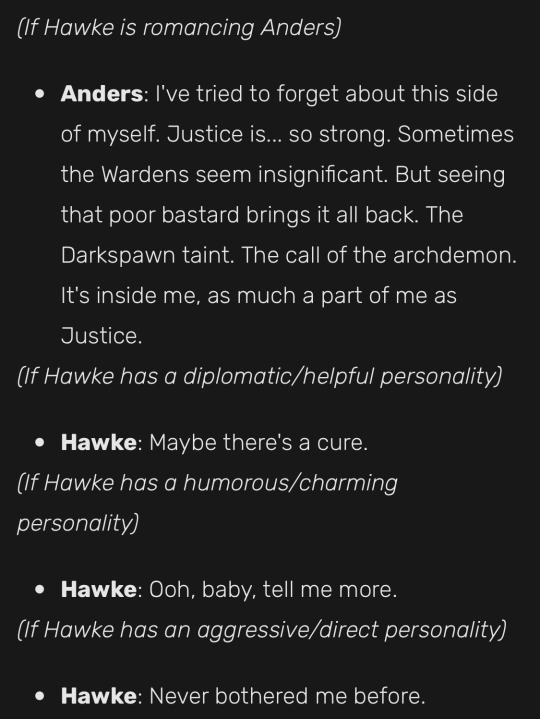

anyway i think they’re cute... i like that you get to kind of match justice’s intensity, like you’re both interpersonally terrible and Too Much All The Time. i also think anders is canonically a guy who has daydreamed for his entire life, from little apprentice anders doodling giant cats who eat templars, to whatever that insane mark of the assassin banter is abt his fantasy of hawke freeing him, essentially abt What If There Was Someone Who Loved and Could Protect Me... that would be Pretty Cool 👀... and i’m a simple person w simple interests so it makes me happy to give him a large angry s/o to aggressively do just that
#i encourage more people to give red hawke a try. they r pretty cool#you just have to dodge the insane dialogue agshsjsksks#anders#keir hawke
143 notes
·
View notes